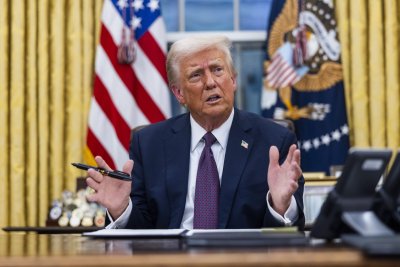
Nov. 15 (UPI) — President Donald Trump has issued second pardons to supporters who breached the U.S. Capitol on Jan. 6, 2021, this time on separate related offenses.
The clemancy for Dan Wilson and Suzanne Kaye were announced online on Saturday by Ed Martin, a longtime supporter of the Jan. 6 rioters who is the Justice Department’s pardon attorney.
They were signed Friday by Trump.
“Thank you: Post! Danny Wilson is now a free man. When I was DC’s U.S. Attorney, and now as U.S. Pardon Attorney, I advocated for this clemency, which the president granted Friday.@POTUSThank you,” Ed Martin posted on X with a copy of the pardon.”
In another post with the document, Martin wrote: “Thank you: POTUS! The Biden DOJ targeted Suzanne Kaye for social media posts-and she was sentenced to 18 months in federal lock up. President Trump is unwinding the damage done by Biden’s DOJ weaponization, so the healing can begin.”
In May 2024, Wilson pleaded guilty to conspiracy to impede or injure a federal officer and was sentenced to five years in prison.
But the Louisville, Ky., man was in prison for possession of a firearm by a prohibited person and possession of an unregistered firearm. He was sentenced in August 2024 to prison until 2028.
It stems from when his home was searched in June 2022 as part of the federal government’s investigation of the intrusion.
A White House official told Politico that “because the search of Mr. Wilson’s home was due to the events of January 6, and they should have never been there in the first place, President Trump is pardoning Mr. Wilson for the firearm issues.”
When Trump retook office on Jan. 20, he pardoned him along with clemency to about 1,500 Jan. 6 defendants, including pardons and commutations.
But Wilson had remained in prison on another conviction, along with a few other defendants for other federal crimes.
The Department of Justice at the time said “numerous firearms and ammunition” were recovered and forbidden because of previous felony convictions.
“For too long, my client has been held as a political prisoner by a government that criminalized dissent,” George Pallas, his attorney, said in a statement to CBS News. “President Trump’s pardon rights this wrong and sends a clear message that peaceful Americans will not be persecuted for their beliefs. Mr. Wilson is innocent, he has always been innocent, and this pardon proves it.”
Wilson had occasionally discussed bringing firearms to the Capitol, but ultimately arrived unarmed.
During the day, he posted messages and spoke to other members of his far-right groups, the Oath Keepers and Gray Ghost Partisan Rangers militia.
Initially, the Justice Department argued that Trump’s pardons did not extend to Wilson’s gun charges, but later changed its position. They received “further clarity on the intent of the Presidential Pardon.”
U.S. District Judge Dabney Friedrich, who oversaw Wilson’s case, criticized extending the pardon to cover offenses discovered in the course of the investigations. He was nominated by Trump.
Kaye, of Boca Raton, Fla., was sentenced two years ago to 18 months in prison for threatening to shoot FBI agents who had sought to question her about her involvement in the Capitol attack.
She denied that she had been at the Capitol that day, according to court records obtained by The New York Times. Before meeting FBI agent, she posted a series of videos online threatening the agents.
Jeremy Brown, also an Oath Keeper, was released from a seven-year sentence after his attorneys and the Justice Department claimed the pardon covered Brown’s unrelated conviction for illegally possessing classified information and grenades.
Elias Costianes also was released from jail after the Justice Department declined to fight the appeal of his conviction for illegally possessing firearms.
Edward Kelley was recently sentenced to life in prison for conspiring to kill the officers and FBI agents who investigated his involvement in the Jan. 6 attack. Kelley had contended Trump’s pardon covered the conspiracy charge, but the Justice Department opposed him.
The Justice Department has opposed efforts by David Daniel after the FBI discovered child pornography on his computer during a Jan. 6-related search.